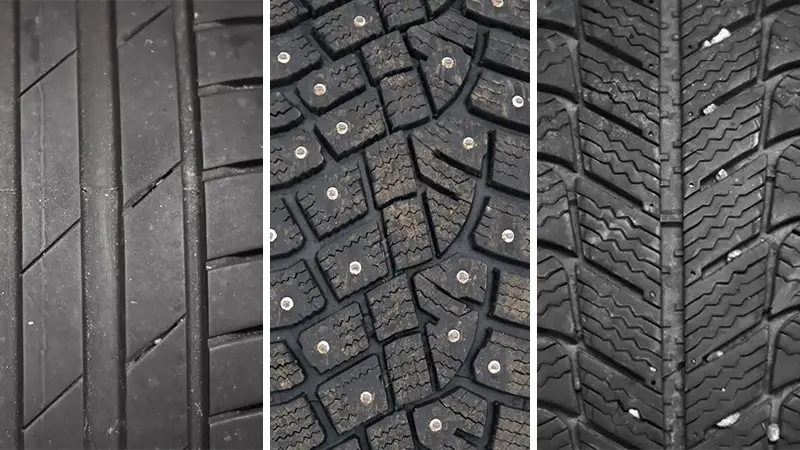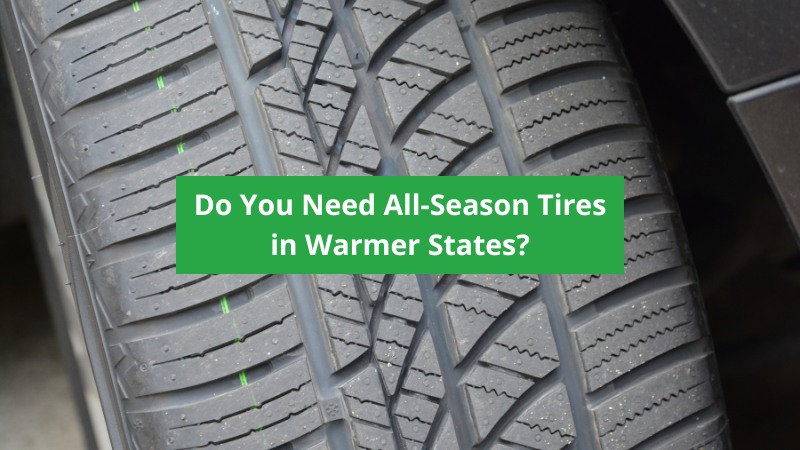Deciding on the right set of tires for your vehicle can be a daunting task, especially in warmer states.
The idea of all-season tires might seem tempting, as they are designed to provide year-round performance. However, do you really need them in warm US states, where temperatures rarely dip below freezing?
In this article, we will explore the pros and cons of all-season tires in warmer states, as well as consider the specific conditions in each region.
Furthermore, we will compare them to alternative tire options such as summer tires to help you make an informed decision for your vehicle.
Understanding All-Season Tires
All-season tires are designed to provide a balance of performance across a wide range of weather conditions. In warmer states, the question arises whether these tires are necessary or not.
Let’s explore the specifics of all-season tires, their benefits and limitations, and how they compare to summer and winter tires.
Benefits and Limitations
All-season tires offer several advantages, especially for drivers in warmer states. They ensure a comfortable and quiet ride with decent traction in wet and dry conditions.
Moreover, they usually have a longer tread life than summer or winter tires, making them a cost-effective solution for year-round driving.
However, all-season tires have their limitations too. They are not as effective in extreme weather situations like heavy snow or ice, where winter tires are specifically designed to perform better.
Although all-season tires can handle the cooler temperatures of warmer states, their performance may not match that of dedicated winter or summer tires during the respective seasons.
Comparison to Summer and Winter Tires

Summer tires are designed for optimal performance in warm and dry conditions. They have a better grip on the road and shorter braking distances compared to all-season tires when driving in high temperatures.
However, their performance decreases significantly in colder temperatures, making them unsuitable for use in winter months.
Winter tires, on the other hand, perform exceptionally well in cold weather, snow, and ice. They have a specific tread pattern and rubber compound that allows them to maintain flexibility in freezing temperatures, providing maximum traction.
In warmer states, all-season tires can be a practical choice for drivers who experience mild temperature fluctuations and occasional rain.
However, if you frequently encounter extreme weather conditions, it might be wise to consider investing in dedicated summer and winter tires for optimal performance throughout the year.
Factors to Consider in Warm States
When deciding whether you need all-season tires in warmer states, there are a few key factors to consider.
In this section, we will examine the climate variations, driving conditions, and road surfaces of warm US states, to help you make an informed decision.
Climate Variations
While warmer states are generally known for their mild and temperate climates, there can still be variations in temperature and precipitation. For example, Southern California experiences a dry, hot climate, whereas Florida is known for its warm, humid weather.
Do you often encounter rain, or is it mostly sunny in your region?
It’s crucial to consider how these variations may affect your driving experience and tire performance.
Bridgestone Tires suggests that summer tires provide optimal handling in both dry and wet conditions, whereas all-season tires offer year-round capabilities, including light snow and cold weather situations.
Driving Conditions
Think about the types of driving conditions you frequently encounter. Are you mainly driving in urban environments with smooth roads and consistent traffic patterns, or do you regularly venture on twisty backroads or racing up mountain passes?
Take a moment to evaluate your typical driving situation, and consider whether all-season tires would suit your needs. According to Les Schwab, summer tires excel in high-performance driving conditions, while all-season tires provide a more balanced performance across various driving scenarios.
Road Surfaces
Lastly, the road surfaces in your area are crucial to consider when determining whether all-season tires are right for you.
Does your region have well-maintained highways, or is it common to encounter potholes and gravel surfaces?
To ensure the best possible driving experience, it is essential to choose tires that can handle your local road conditions.
Discount Tire highlights that while summer tires offer excellent grip and handling on dry pavement, all-season tires deliver consistent performance on various surfaces, including light off-roading and uneven terrain.
When weighing these factors, ask yourself if all-season tires will provide the best overall performance for your driving needs in warm states.
Remember, tire selection should always prioritize safety, performance, and driving comfort.
Evaluating All-Season Tires in Warm US States

California
California experiences diverse weather conditions, from sunny beaches to snowy mountains. Do you need all-season tires in the Golden State?
In coastal areas, such as LA and San Diego, all-season tires might not be necessary, as summer tires could suffice.
However, if you often travel to colder or mountainous regions, all-season tires provide a better and safer option.
Texas
Everything’s bigger in Texas, including the diverse climate.
While summer tires work well on hot and dry roads, Texas experiences unpredictable weather conditions.
Hence, for areas like Dallas, Houston, and San Antonio, all-season tires can help deliver balanced performance in wet and dry conditions throughout the year, making them a suitable choice.
Florida
Florida, the Sunshine State, is known for its tropical climate and highways lined with palm trees. But does that mean all-season tires aren’t needed?
Many of Florida’s drivers can rely on summer tires, but all-season tires offer a compelling alternative for their wet condition performance, as Florida is prone to sudden rainstorms.
Arizona
Arizona’s hot desert conditions might make you think twice about all-season tires. However, not all of Arizona experiences the same climate.
In cities like Phoenix and Tucson, summer tires might be adequate. But those living closer to Flagstaff or other mountainous regions might benefit from all-season tires due to the temperature fluctuations and occasional snowfall.
Georgia
Warm and humid, Georgia experiences mild winters and hot summers.
Although summer tires might suffice for Atlanta and Savannah, for year-round convenience and improved performance during wet conditions, all-season tires are a good option to consider.
Other Warm States
For other warm US states, such as Louisiana, Mississippi, and South Carolina, weighing the pros and cons of all-season tires depends on local climate and driving requirements.
Are wet roads and mild winters a concern in your area? If so, all-season tires might be a practical choice, offering a balanced performance year-round.
Making the Right Tire Choice
Assessing Your Needs
When deciding whether you need all-season tires in warmer states, it’s important to consider your specific driving conditions and requirements. Do you frequently drive in mountainous areas or encounter variable weather conditions? If so, all-season tires might still be a suitable choice for you.
On the other hand, if your region sees consistent dry and warm weather, you may benefit more from summer tires, which are designed to provide optimal performance in such conditions.
Nonetheless, all-season tires can still provide a decent level of grip and handling for occasional wet roads, and their versatility may justify their use in warmer states.
Consulting with Professionals
Your best bet is to consult with local tire professionals or service centers about the specific needs of your vehicle and driving conditions within your region.
They can offer tailored advice and recommendations, taking into account your vehicle type and the state’s climate.
Remember that some warmer states like California or Arizona may have significant variations in weather and terrain, so specialized advice is crucial.
Cost and Performance Considerations
When weighing your options, it’s essential to consider both cost and performance. All-season tires might have a longer lifespan, potentially saving you money in the long run.
Compare the costs of all-season tires, summer tires, and any potential seasonal tire changes. Are the potential savings worth the compromise in performance?
Consider factors such as wet grip, dry grip, and road holding when evaluating performance. Summer tires often outperform all-season tires in warmer, drier conditions, but all-season tires offer versatility and adequate performance for occasional rain-affected roads.
Ultimately, the choice between all-season and summer tires in warmer states is a matter of personal preference, taking into consideration factors such as cost, driving conditions, and expert advice. Carefully weigh these factors when making your decision to ensure you select the right tires for your needs.
Conclusion
In warmer states, do you actually need all-season tires? Let’s break it down, state by state.
Florida, Texas, and Arizona are known for their hot climates. Though rain and wet conditions may be common in some areas, these temperatures generally remain high throughout the year. In such states, summer tires might better suit your needs, providing optimal performance and safety on both dry and wet roads.
But what about Georgia or Louisiana? While these states experience warmer climates, they also encounter occasional icy conditions during winter months. In situations like these, all-season tires offer the versatility and grip needed to handle various weather conditions.
California and Nevada present unique challenges due to their diverse climates. Coastal California may benefit from summer tires, whereas mountainous regions would require all-season or even winter tires.
So, should you invest in all-season tires in warmer states? The answer largely depends on your specific region and the driving conditions you face.
Consider factors like weather patterns, road conditions, and your driving habits when making a tire selection. Ultimately, it’s about finding the right balance between performance, safety, and adaptability.
Hi, my name is Niklas, the head content creator & CEO of Whirling Wheelz. I am very interested in vehicles of all kinds, mainly cars. I have a car mechanics degree from high school and a big hobby of mine is to follow the WRC (World Rally Championship) both online and through travel.


